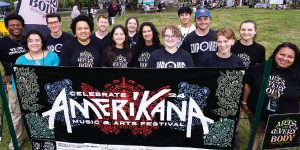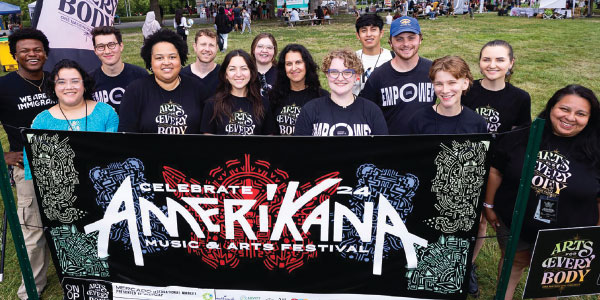
Contact tracing is one of the most powerful weapons we have to slow the spread of COVID-19 in Wyandotte County. What exactly is it? Victor Aguilar, a COVID-19 Investigator with the Unified Government Public Health Department, explains his job and why it’s so important to help a COVID-19 Investigator if they call.
How does Contact Tracing work?
When someone tests positive, that information is sent to the Wyandotte County Public Health Department, where I work. My job is to contact that person and ask them a series of questions so we can figure out where they’ve been, who they’ve been in contact with, etc. That information is key, because we need to contact those people to let them know they have probably been exposed to COVID-19 and should get tested, to protect their health and their friends and family.
What questions do people commonly ask when a COVID-19 investigator calls them?
The first question is, “where did you get my information?”. We get that information from the site where you got tested. We’re contacting you to find out where you’ve been and who else you’ve been in contact with, so we can reach out to them to let them know they may have been exposed and should get tested.
One of the key things I always reassure people about is that this phone call is to help protect their health and the health of the community. Our calls have nothing to do with law enforcement or immigration – our goal is to find out who you’ve been in contact with, nothing else.
What questions do you ask?
We’ll ask people if they’ve been to any gatherings – say, to a restaurant, birthday party, family gathering, church gathering, have they been to work – things like that. We know people may not be comfortable giving out that kind of information at first, but it’s so important to help us when we call. If you test positive and we don’t reach out to everyone you’ve been in touch with, we can’t get people tested and protect our community. By cooperating with the COVID-19 Investigator, you’re performing a huge public service.
What kinds of support can you offer to people who test positive?
We want people who test positive to know they’re not alone in this. We’re here to help. I give people my name and number – they can call me with any questions they have. If needed, we can have food delivered to you. We have resources that can help you pay your rent if you’re sick. We can help with unemployment benefits. I can also provide a letter that you can share with your employer, explaining that you’ve tested positive and will need to be off work while you recover, for your health and wellbeing and that of your colleagues.
What else would you tell people in the Latinx community to do, if they are contacted by a COVID-19 Investigator?
I would ask people to be patient with us. You may be contacted by someone who doesn’t speak Spanish. In those cases, the investigator will use a translator service. The Investigator will ask their question, which the translator will translate into Spanish. This can be a bit cumbersome and confusing – we understand it’s not an ideal situation. But I would ask people to please be patient and cooperate with our process. It’s the best way we have of identifying people who may have been exposed to COVID-19 and helping them. Getting that information is the best way to protect our community.
To learn more about testing locations and hours in Wyandotte County, visit wycokck.org/COVID-19 or call 3-1-1.
_______________________________________________________________________________
Cómo ayuda el rastreo de contactos a retrasar la propagación de COVID-19
El rastreo de contactos es una de las armas más poderosas que tenemos para frenar la propagación de COVID-19 en el condado de Wyandotte. ¿Qué es exactamente? Víctor Aguilar, un investigador de COVID-19 del Departamento de Salud Pública del Gobierno Unificado, explica su trabajo y por qué es tan importante ayudar a un investigador de COVID-19 si llama.
¿Cómo funciona el rastreo de contactos?
Cuando alguien da positivo, esa información se envía al Departamento de Salud Pública del Condado de Wyandotte, donde trabajo. Mi trabajo es contactar a esa persona y hacerle una serie de preguntas para que podamos averiguar dónde ha estado, con quién ha estado en contacto, etc. Esa información es clave, porque necesitamos contactar a esas personas para hacerles saber que probablemente han estado expuestos al COVID-19 y deben hacerse la prueba para proteger su salud y la de sus amigos y familiares.
¿Qué preguntas suele hacer la gente cuando los llama un investigador de COVID-19?
La primera pregunta es, “¿de dónde sacaste mi información?”. Obtenemos esa información del sitio donde se hizo la prueba. Nos estamos comunicando con usted para averiguar dónde ha estado y con quién más ha estado en contacto, para que podamos comunicarnos con ellos para informarles que pueden haber estado expuestos y deben hacerse la prueba.
Una de las cosas clave sobre las que siempre tranquilizo a la gente es que esta llamada telefónica es para ayudar a proteger su salud y la salud de la comunidad. Nuestras llamadas no tienen nada que ver con las fuerzas del orden o inmigración; nuestro objetivo es averiguar con quién ha estado en contacto, nada más.
¿Qué preguntas hace?
Le preguntaremos a las personas si han estado en alguna reunión, por ejemplo, en un restaurante, una fiesta de cumpleaños, una reunión familiar, una reunión en la iglesia, si han ido a trabajar, cosas así. Sabemos que es posible que la gente no se sienta cómoda dando ese tipo de información al principio, pero es muy importante ayudarnos cuando llamamos. Si el resultado de la prueba es positivo y no nos comunicamos con todas las personas con las que ha estado en contacto, no podemos hacer que la gente se haga la prueba y proteger a nuestra comunidad. Al cooperar con el investigador de COVID-19, está realizando un gran servicio público.
¿Qué clase de apoyo ofrece a la gente que da positivo en la prueba?
Queremos que la gente que da positivo sepa que no están solos en esto. Estamos aquí para ayudar. Le doy a la gente mi nombre y número; pueden llamarme si tienen alguna pregunta. Si es necesario, podemos hacerle llegar comida. Tenemos recursos que pueden ayudarlo a pagar el alquiler si está enfermo. Podemos ayudar con las prestaciones por desempleo. También puedo darle una carta que puede compartir con su empleador, en la que le explique que dio positivo en la prueba y tendrá que ausentarse del trabajo mientras se recupera, por su salud y bienestar y el de sus colegas.
¿Qué más les diría a las personas de la comunidad latina que hagan si son contactados por un investigador de COVID-19?
Le pediría a la gente que tenga paciencia con nosotros. Es posible que alguien que no hable español se comunique con usted. En esos casos, el investigador utilizará un servicio de traductor. El investigador hará su pregunta, que el traductor traducirá al español. Esto puede ser un poco engorroso y confuso; entendemos que no es una situación ideal. Pero le pido a la gente que tenga paciencia y coopere con nuestro proceso. Es la mejor manera que tenemos de identificar a las personas que pueden haber estado expuestas al COVID-19 y ayudarlas. Obtener esa información es la mejor manera de proteger a nuestra comunidad.
Para obtener más información sobre los lugares y los horarios de las pruebas en el condado de Wyandotte, visite wycokck.org/COVID-19 o llame al 3-1-1.









